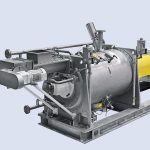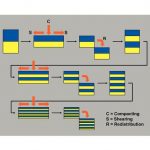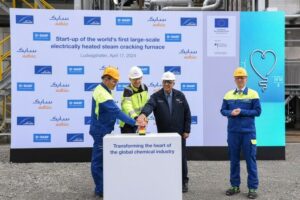How can complex handling in kneading processes be minimised, processing times shortened and maintenance costs reduced? The answer lies in automated systems. Yet, these require high-performance machines and components – Lödige’s TurbuKneader, for example.
The author: Peter Illing Head of Mixing and Reacting Technologies Gebrüder Lödige Maschinenbau
At first glance there appear to be few differences between mixing, stirring and kneading. And, in fact, these processes exploit the typical product characteristics to convert a variety of original materials to a homogeneous mixture. A closer look, however, reveals that a mechan-ical fluid bed is created when powdery or granular components are mixed – for example in a plough share mixer. By contrast, during stirring the compound ingredients are blended to form homogeneous dispersions, emulsions and solutions with the aid of high-speed stirring systems such as dispersers or dissolvers.
Characteristics of kneading processes
Unlike when mixing, the system must perform two processes simultaneously for kneading, namely compacting and redistributing. Each of these generates high shear forces, so that the components gradually combine to form the desired homogeneous plastic mass. Depending on the product characteristics and operating parameters, the considerable heat created in the process must be extracted by means of cooling systems. Due to the three-dimensional product chamber a further process takes place parallel to this: the division of the mass. It is essential for the kneading mechanisms to fit flush within the chamber in order to avoid dead space. Modern kneading systems must also be capable of producing a broad bandwidth of final products with various viscosities. In this context the viscosity value is not the only factor that is used to describe the flow properties of components and products. Basically, the viscosity of plastic masses can range from slightly fluid to a solid state. However, whether a material is fluid, paste-like or plastic depends on its rheological properties. For example, thixotropic mixtures are plastic in a quiescent state. If they are disturbed, a flowing mass forms. Exactly the opposite is the case with latent mixtures.
This serves to illustrate the complexity of controlling process parameters in industrial kneading. Conventional kneading systems therefore normally work in batch mode, which simplifies process control. Two-shaft kneading systems such as double-Z, sigma or internal kneaders are also very common. However, these machines have serious disadvantages: the production process demands intensive operation and maintenance. For example, the material is usually discharged via technically complex tilting systems. Baked-on residue must be removed manually, often producing potentially harmful vapours.
Single-shaft kneading system
The TurbuKneader is based on a single-shaft design with a specially shaped and configured kneading mechanism. Precisely adapted to the space-saving, cylindrical product chamber to prevent any dead space, it releases enormous shear forces. Material product residue is thus unable to stick to the chamber walls. The design also permits fixed connections for temperature control, filling and discharge. The result: over 50 % more usable filling volume compared to conventional solutions. In addition, because there is no need for complicated discharge via a tilting device, laborious manual removal of residue is no longer required. Simi-larly, no complex drive units or hydraulic processes are needed. The kneading system can be cleaned fully automatically while the high drive power of the single-shaft TurbuKneader shortens processing times. Furthermore, the machine is easy to operate and during normal running it requires practically no human intervention. This considerably reduces batch times and means far less wear and maintenance intensity. The system has only two bearings and seals. Generously dimensioned feeding and discharge systems guarantee smooth production processes.
Multiple applications
Lödige supplies the TurbuKneader for various volumes up to 5000 l. It can be used to manufacture products with widely differing viscosities. Among its typical applications are salt milling (modification of pigments), pigment flushing, pigment preparations and polymer-bound printing inks, putty, sealing and filling compounds, highly viscous dispersions, BMC compounds, hot melts, polymer-bitumen compounds, foods and stimulants. Its potential uses in industrial applications are correspondingly varied. Lödige supplies the TurbuKneader both as a stand-alone solution and as part of an overall process engineering concept, integrating in-house mixers, dryers and reactors. The goal is to create balanced, all-embracing solutions for batch and continuous operation, tailor-made for individual requirements. With its highly automatic mode of functioning, the TurbuKneader is a simple-to-operate alternative to the usual two-shaft kneading systems in batch mode. The high-speed kneader produces a broad spectrum of viscosities and is thus a viable option for many industries. Its cylindrical, space-saving design with a finely adjusted kneading mechanism ensures optimum results. Labour-intensive discharging processes are no longer required. Thanks to the powerful drive, processing times are significantly shorter. Foregoing complicated drive technology and tipping hydraulics have a positive effect on maintenance requirements and service life. Besides important time advantages, the TurbuKneader thus offers cost benefits for personnel, maintenance and wear.
cpp-net.com/0112448
Share:









